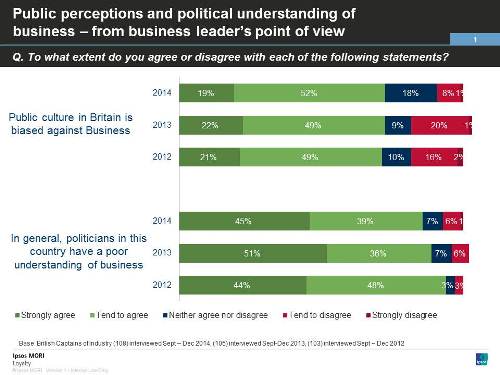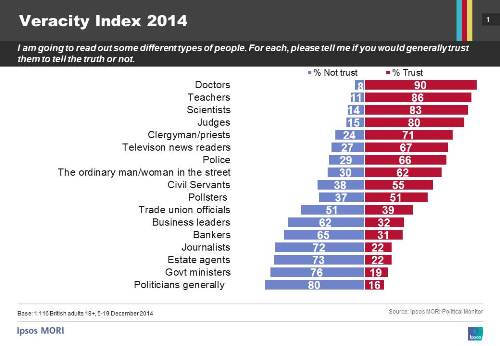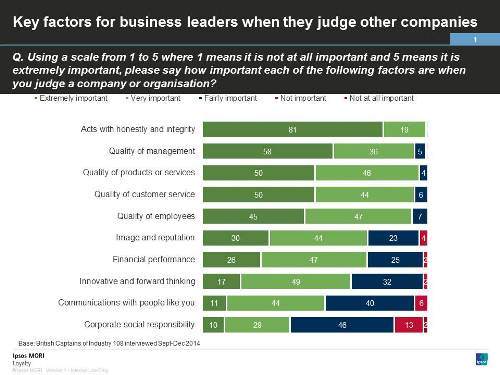Public culture in Britain is biased against business and most politicians don't understand business

Over the last three years seven out of ten of Britain’s business leaders have felt that public culture in Britain is biased against business - 71% agreeing this is the case in Ipsos’s most recent Captains of Industry survey and the level has been at least 70% since 2012.
What is also a concern is that they will not be able to rely on politicians to explain the importance of business to the economy because most business leaders (84%) think politicians in general in this country have a poor understanding of business. This low perceived level of political understanding exists even under the Conservative-led coalition government, the political party that the majority of business leaders (87%) in this survey would prefer to see re-elected (either as a majority government, 77%, or leading another coalition, 10%) in terms of being best for their business.

The perception of many of the Captains of Industry interviewed on public distrust of business (if not actual bias against it) is justified judging from other survey results. Ipsos’s Veracity Index shows that over half of British adults (57%) do not trust business leaders to tell the truth. Also it probably would not help much if politicians did have a better understanding of business, either when discussing it with voters or when dealing with business as a service provider, since politicians generally are even less trusted by the public (77% do not trust them to be truthful) than business leaders. Three times as many of British adults distrust politicians generally to tell the truth compared with the ordinary man or woman in the street (only 26% of British adults do not trust the ordinary man or woman in the street).

Business leaders’ concern about public mistrust is reflected in the ways that they judge other companies and organisations. Above all, the people managing the UK’s largest businesses think that companies must act with honesty and integrity – 81% of business leaders feel that this is extremely important, ahead even of the quality of companies’ management, products or services, customer service or their employees. This emphasis has been consistent for the last three years, with 90% considering business honesty and integrity to be extremely important in 2013 and 75% in 2012, ahead of all other factors.

The stream of revelations in recent years about various business, banking and non-business service provider “scandals” seem to have made business leaders aware, if they were not already, of the reputational and other damage that can be caused to a company or organisation by an obvious failure to act with honesty and integrity.
It will be interesting to see over the next three years if this level of concern among Captains of Industry about public perceptions of business honesty and integrity remains as high, and whether or not public distrust of business leaders will worsen, bringing them even closer to the image of the greatly distrusted politicians in terms of being trusted to be truthful. Technical note Ipsos interviewed 108 UK Captains of Industry between September and December 2014. Nearly all (104) of these interviews were conducted face to face and the remainder by telephone. Survey participants are executive board-level directors and chairmen from the UK’s largest 500 businesses by turnover and the top 100 financial companies by capital employed.


